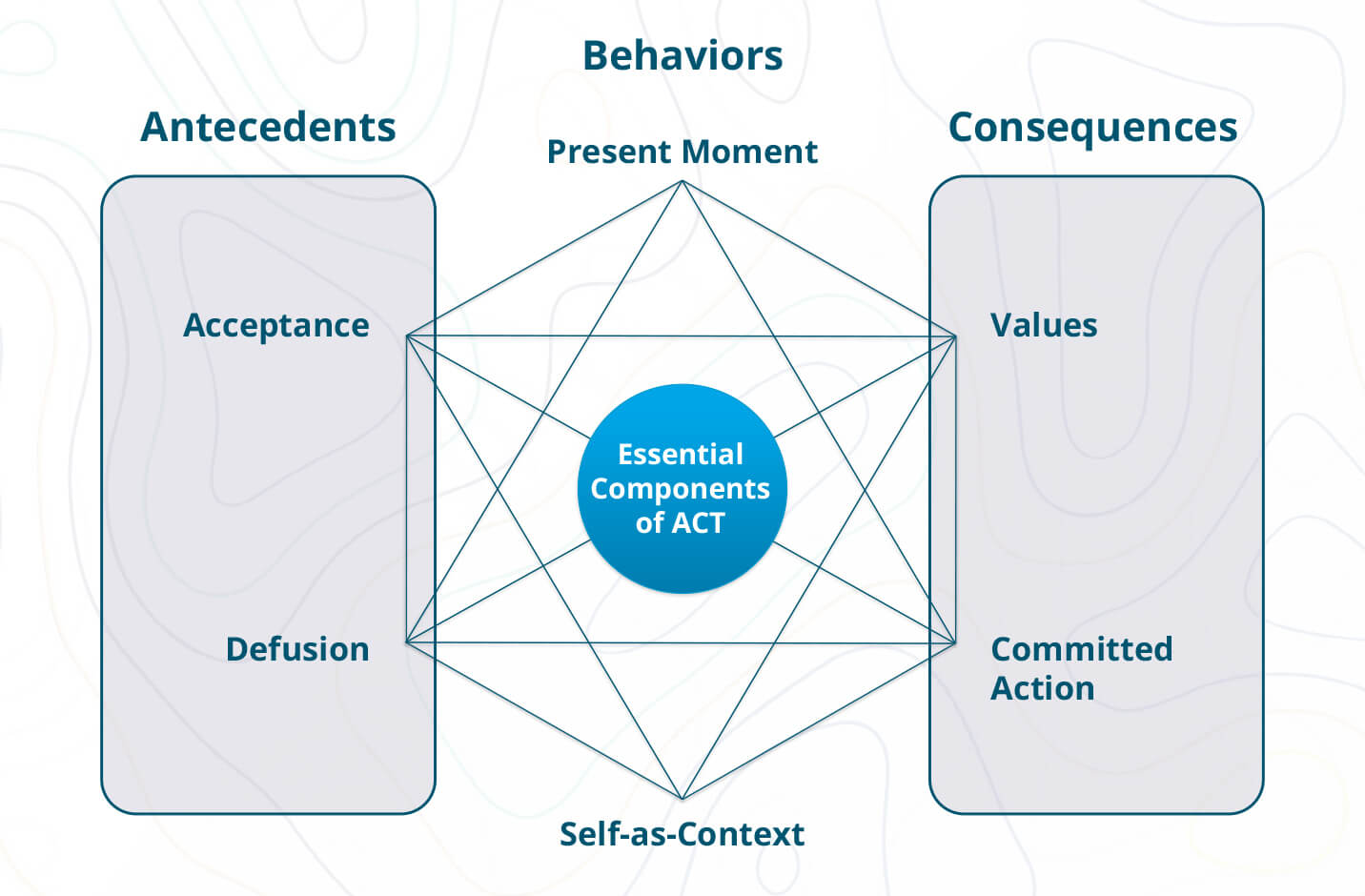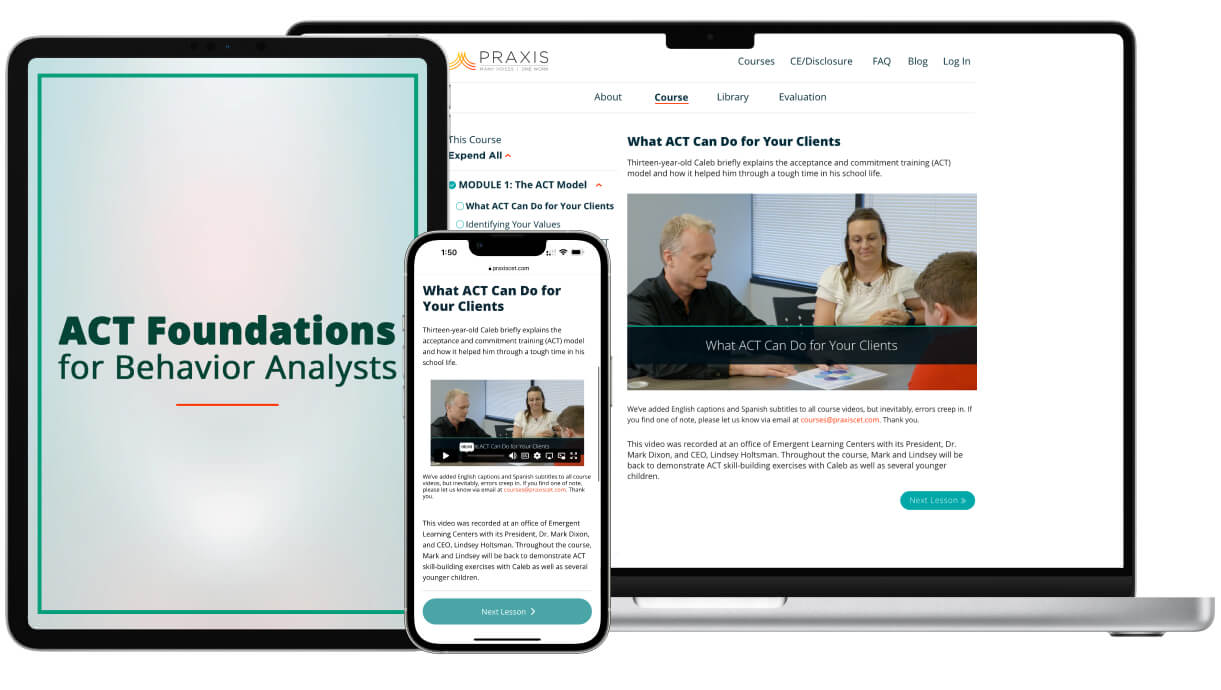
ACT Foundations for Behavior Analysts
Use Acceptance and Commitment Training within Your Scope of Practice and
Get Powerful New Tools to Transform People’s Lives
Inside this foundational course made by and for behavior analysts, you’ll learn:
- The behavior analytic roots of RFT and ACT
- The behavioral principles of RFT and the ACT model
- How to apply ACT within the scope of your practice
- Evidence-based tools to improve your learners’ outcomes

Expand Your Toolkit with:
- 8 core modules with 12 hours of high-quality video
- Clinical demonstration videos
- Case study videos
- Experiential exercises
- Bonus material
- Lifetime access
16 CE Hours Available for:
- Behavior Analysts
- Psychologists
- Counselors
- Social Workers
Enroll Now
Get Instant Access
or
For group purchases email courses@praxiscet.com. Group discounts are available for 5+ registrations.
How to Improve Outcomes for Those You Serve with the Evidence-Based Power of ACT
A letter from Dr. Steven C. Hayes, Dr. Mark R. Dixon, and Dr.
Ruth Anne Rehfeldt
Behavior analysts have a tradition of using science-based principles to make a real difference for the individuals we serve — including those in society who are sometimes not remembered, attended to, and cared for.
With interventions based on these principles, we collaborate with autistic individuals, persons with intellectual or other developmental disabilities, and their families to help them live fulfilling and meaningful lives.
For much of the history of behavior analysis, the interventions we’ve used have relied on direct contingency principles.
These principles have served us well in achieving a variety of important behavioral goals, particularly for those with limited verbal abilities.
But behavior analysts also frequently work with individuals who face challenges that are difficult to address because they involve private events.
These challenges may lead to combative behaviors and putting others, or the environment, in harm’s way.
Or they may include disruptive emotional responses in the classroom or other public places, making it hard to reach goals of inclusion.
Beyond that, the individuals we serve may reveal a struggle with private events simply by withdrawing from others.
Behavior analysts working with these challenges do everything they can within the three-term contingency model — but when nothing works, they can feel stuck.


When the ABC Model Is No Longer Enough
When a behavior analyst tries to address behavior goals with the traditional three-term contingency model, but it just isn’t working, they may feel they’ve come to the end of their competency.
And yet the individuals they serve continue to struggle with aggression, anger, sadness, self-injury, and other maladaptive behaviors.
They struggle to learn.
They struggle to make friends.
Or they struggle to get that first job.
When this happens, it becomes difficult for behavior analysts to do a functional analysis that tells them specifically what’s going on.
Often, the complexity of the case seems to far exceed that of direct-contingency-based interventions.
The barriers behavior analysts come up against in these cases may appear to be related to:
- What individuals feel, think, remember, or long to do
- Preoccupation with thoughts about the past or future
- Overly rigid rules about how they should be or how the world should be
These exact same things happen with parents and staff as well, leading to poor compliance with programs, burnout, or drop out.
When clinicians come up against these limitations, they may continue with what they know and hope for the best.
Or they may refer the individual to another professional, even though their problems appear to be within their scope of practice.
They may tell parents or staff to persist with their programs, knowing full well that verbal instructions alone are rarely enough to produce lasting behavior change.
And all the while, they may wonder, “What else can I do?”


The Way Forward for Behavior Analysis
It turns out that a primary roadblock within traditional behavior analysis has much to do with conceptual and technical limitations related to language and cognition.
When behaviorism was first developed, it restricted the direct scientific analysis of thoughts, feelings, and other private events, which was in stark contrast to the dominating schools of psychology at the time.
It wasn’t until the mid-20th century that B. F. Skinner opened the door to addressing private events in behavior analysis by concluding that a scientifically valid study of thoughts and feelings was possible — but he stopped short of saying that it was needed to understand overt behavior.
The next step was to provide a relatively adequate empirical analysis of language and cognition — one that would provide both the conceptual and technical means of addressing verbal behavior across the full age range within behavior analysis.
That step was undertaken by the functional contextualist wing of radical behaviorism beginning in the 1980s with the development of relational frame theory (RFT). (Full disclosure from Steve Hayes: originating RFT was my attempt to rise to this challenge!)
According to RFT, the core of human language and cognition is the ability to learn to relate objects, thoughts, and events to one another and thereby change behavior. Specific forms of relationships are called “relational frames.”
Relational framing, which typically begins at 12–18 months and then rapidly expands, can alter the function of the traditional ABC contingency for anyone with sufficient verbal abilities.
What RFT provides is an explanation of how thoughts, memories, emotions, and other private events can influence the overt behaviors we are concerned with as behavior analysts — without reverting to mentalism — and the basis for tools that can be used to alter that influence.
When struggling to help individuals cope with aggression, self-injury, and other challenges, behavior analysts often get stuck because they have no way to account for the influence of these private events on the traditional ABC contingency model.
But, by providing a way to do so…
RFT gives you a path forward when verbal behavior enters the picture.
Unlike Skinner’s verbal operants, relational frames are known to alter how direct learning processes work.
And so, according to RFT, it is not only possible to analyze language and cognition, it is required in order to understand human behavior once language abilities reach a certain level.
With the analysis of language and behavior that RFT provides, you can seamlessly integrate private events, and their influence on the direct contingency model, into the practice of behavior analysis.
And that brings us to the treatment model based on RFT.


ACT: The Model Powered by RFT
Relational framing allows humans to communicate, problem solve, understand the world, and learn without the need for direct experience.
But along with these benefits comes a dark side — the possibility of cognitive fusion and experiential avoidance.
Cognitive fusion occurs when our thoughts function as literal truth and dominate our behavior. Said more behaviorally, this means that verbal stimuli dominate over other needed sources of behavioral regulation.
Experiential avoidance is the attempt to avoid or escape private events such as thoughts, emotions, sensations, or urges, even when it causes behavioral harm in the long term.
These two language processes are thought to be the most significant sources of psychological inflexibility that lead to ineffective behavioral repertoires in verbal populations.
To address this inflexibility, acceptance and commitment training (ACT) employs six psychological flexibility processes.
These processes aim to increase psychological flexibility, foster contact with events in the here and now, and increase the likelihood of behaving in a way that serves an individual’s values.
The six processes, along with brief definitions, are as follows:
Defusion: A weakening of overly rigid control of thoughts over behavior, such that more variable behavior can occur
Acceptance: The active and aware exposure to private events without unnecessary attempts to control, avoid, or change their frequency or form
Present Moment: Strengthening your ability to attend to stimuli in the present moment while weakening the control of thoughts and emotions concerning past, future, or imagined events
Self-as-Context: Development of a flexible perspective-taking repertoire
Values: Establishing intrinsic reinforcers that govern how you want to behave
Committed Action: Behavioral habits that move you in the direction of your values
The Hexaflex is a common graphic representation of the ACT model:

The general clinical goals of ACT, then, are to undermine the overly rigid control of thoughts, feelings, and other private events on behavior so that one can behave in a way that is more consistent with their chosen values.
An example will demonstrate how ACT builds upon a traditional behavior analytic approach:
You’ve been working with “Jack,” who struggles with aggressive behavior.
He’s had emotional outbursts in class during which he’s torn up his homework, thrown chairs and other objects, and injured a staff member.
He also recently threw a glass at his mother, striking her in the face, as she was trying to help him with his math homework.
These types of challenges have been happening once or twice a week, making traditional data collection difficult and ineffective.
You’ve tried all the traditional ABC-based interventions you can think of, but the frequency of these behaviors hasn’t decreased.
You have been incorporating ACT into your practice and decide to perform an ACT-based functional assessment and analysis.
You discover that Jack often has thoughts that he isn’t smart enough for math and that kids at school think he’s stupid — and, further, that he is fused with these thoughts, giving them excessive control over his behavior.
As part of your ACT-based treatment plan, your first few sessions focus on present-moment and defusion exercises to help Jack focus on the here and now, rather than on the stories his mind is telling him.
After a few sessions, you move on to some acceptance work to help Jack struggle less with his thoughts, understand that it’s okay to have them, and realize that everyone has these thoughts from time to time.
After four weeks, you notice he’s having fewer emotional outbursts and has been able to focus on his work more consistently.
To build upon this progress, you perform some values and committed action exercises to help Jack establish a stronger connection with desired behaviors and give him small, achievable steps he can take toward those behaviors.
After two months, you continue to observe a decrease in the frequency of Jack’s aggressive behavior, and his parents have reported the same at home.
By now you can see that RFT and ACT build firmly upon the traditional behavior analytic model as they seek to overcome its limitations.
This allows you to integrate ACT into your practice while continuing to use all of your current skills. Nothing is taken away.
When you add ACT to your behavior analytic repertoire, you’ll no longer get stuck when encountering problems unique to language and cognition.
You’ll have powerful new tools that give you a path forward as you strive to make a difference for those you serve.
And you’ll be able to help them break the grip of unhelpful private events and more flexibly engage in the educational, social, and work activities that bring meaning and purpose to their lives.


1. More Effectively Help Those You Serve
When you integrate ACT into your practice, you add tools that allow you to more effectively help those with verbal abilities, including those who are neurodivergent as well as neurotypical.
These tools give you the ability to take private events and their effect on direct contingency control into account — something that has not been possible within the behavior analytic tradition before the development of RFT and ACT.
With ACT, you’ll be able to address these private events as they relate to an individual’s behavior, thereby decreasing the need to refer out, all while staying within your scope of practice.
And because psychological flexibility skills are transferable and not specific to just one behavior under a specific instance of stimulus control, they can be generalized to a variety of contexts and not just the setting where they are learned.
Those you serve will carry their skills to social settings, occupational settings, and virtually all areas of their lives and into the future.
Achieve better outcomes

Expand your horizons
2. Expand to Serve Wider Populations
In addition to more effectively helping the populations we traditionally serve, ACT provides a myriad of opportunities to serve new populations — and this is already happening.
One such population is parents and other caregivers.
With the skills that ACT imparts to caregivers, they can be more present and willing as they face the challenges of implementing behavioral strategies with their children.
In the realm of behavioral health and the prevention of chronic diseases, studies have shown that even very brief behavioral interventions can have an impact. Further, ACT has been shown to benefit several health conditions including seizures, chronic pain, and diabetes.
There is evidence that acceptance, values, and committed action could play a role in helping people deal with the fear responses associated with health-related information and take action consistent with the delayed reinforcers of improved long-term health.
ACT work has been shown to benefit several health conditions including seizures, chronic pain, and diabetes.
There is also ACT work being done with those experiencing addiction, where acceptance can help address the avoidance that is often playing a role.
And there are groups on social media teaching ACT skills to young children so that they’re already equipped to be flexible and resilient as they become adults.
Looking to the horizon, imagine offering ACT workshops for individuals in the community, not unlike yoga classes, so they can go home and be more effective parents, family members, and employees, regardless of what behavioral challenges they face.
As the scope of behavior analysis grows, there will be a variety of new vistas into which we can expand and improve the quality of life for individuals, communities, and cultures in meaningful ways.
3. Promote the Autonomy of Individuals
The idea of person-centered planning and intervention has been around for decades.
This is the idea that we want to build the repertoires and use the interventions that put the individuals we serve on a path toward meaningful outcomes.
Despite this, people with developmental disabilities, including adults, often have their values and decisions controlled by someone else their entire lives.
With its processes of values and committed action, ACT is a natural fit for empowering individuals to determine their own values and take the steps necessary to move in the direction of those values.
This is in keeping with changes in the cultural landscape that are leading to different ways to think about behavioral interventions.
Among these changes is the idea that we consider behavior analysis as something we do with those we serve as collaborators, as opposed to something we do to them.
With ACT, you will have powerful tools to help people live with the autonomy, dignity, and self-worth that they deserve.

Lift up those you serve

Strengthen your own skills
4. Optimize Your Performance as a Behavior Analyst
As a part of ACT training, you are encouraged to practice ACT yourself as a way to fully understand the processes, enhance your depth of experience, and be most effective at using it with those you serve.
When you do this, you gain valuable skills that help you to stay in the moment, notice how your own thoughts and feelings play a role in your work, and take actions consistent with your values as a behavior analyst.
ACT can also help you develop self-compassion as a clinician.
In the area of staffing, there is research showing that many common organizational problems could be reduced by using ACT to establish a mindful, values-driven workplace — something that’s in the best interest of those we serve and staff alike.
When practiced by staff, ACT has been shown to improve job satisfaction and reduce burnout.
In addition, studies have demonstrated an increase in indices of happiness for individuals after staff participation in mindfulness training.
This has broad implications not only in terms of improving outcomes, but also for enhancing the success of agencies and clinics.
All of this evidence points to the vital role ACT can play in improving the quality of life for supervisors, frontline staff, and those they serve.
ACT brings the latest in scientific discoveries and progress to behavior analysis.
Data from decades of research shows that by using ACT functional assessment, functional analysis, and intervention tools, behavior analysts can change global measures of a developmentally disabled individual’s repertoire.
Training in relational framing has been shown to raise IQ, reduce maladaptive behavior, and increase adaptive functioning.
With ACT, you can teach people the skills that will help them not only meet the behavioral goals at hand but also participate in all facets of their lives with more flexibility and resilience.
When you integrate ACT into your toolkit, you’ll be participating in the future of behavioral analysis even as you uplift the lives of those you serve.


Bringing ACT to Behavior Analysts
We think incorporating an empirically adequate account of language and cognition is a critical next step for the behavior analyst community.
That account, as we’ve discussed, is available in the form of RFT and ACT.
And, in fact, more and more behavior analysts are choosing to incorporate ACT into their practices.
Should you choose to join them, it will be critical that you have a solid foundation on which to build your competence.
We want to make sure you have access to a convenient, high-quality way to get that foundation — one that’s based on the most up-to-date science.
That’s why we’ve created a comprehensive, on-demand training to do just that.
Inside, we cover two key areas you’ll need to gain a firm foundation in ACT:
The first is a solid base of knowledge in the fundamentals of RFT and the ACT model and how they are firmly rooted in behavioral science.
The second is practical guidance in how to seamlessly integrate ACT into behavior analysis, building upon and enhancing traditional behavior analytic practices without taking anything away.
We also touch on the ways ACT is already helping behavior analysis expand its scope and the myriad of possibilities on the horizon.
We’re excited to offer this training created by and for behavior analysts.
Equipped with the theoretical basis of ACT, practical steps for application, and a vision for the future, you’ll be well poised to more effectively help those you serve and expand into new and promising frontiers.
We hope you’ll join us and learn how to harness the power of psychological flexibility with ACT.


About the Trainers
Dr. Steven C. Hayes
Steven C. Hayes, PhD, is an emeritus professor of psychology at the University of Nevada, Reno, and the originator of both relational frame theory and ACT. An author of 48 books and over 700 scientific articles, his career has focused on an analysis of the nature of human language and cognition and the application of this analysis to the understanding and alleviation of human suffering.
Dr. Hayes has been president of Division 25 of the American Psychological Association, the Association for Contextual Behavioral Science, and of the Association for Behavioral and Cognitive Therapies. He was the first secretary-treasurer of the Association for Psychological Science, which he helped form, and has served a five-year term on the National Advisory Council for Drug Abuse in the National Institutes of Health.
His work has been recognized by several awards including the Exemplary Contributions to Basic Behavioral Research and Its Applications from Division 25 of APA, the Impact of Science on Application award and the International Dissemination of Behavior Analysis award from the Society for the Advancement of Behavior Analysis, and the Lifetime Achievement Award from the Association for Behavioral and Cognitive Therapies. He is the most cited living behavior analyst, and Research.com lists him as the 63rd highest-impact psychologist in the world.
Dr. Mark R. Dixon
Mark R. Dixon, PhD, BCBA-D, is a clinical professor at the Department of Disability and Human Development at the University of Illinois, Chicago, and serves as the faculty director of the Cognition, Behavior, and Mindfulness Clinic there. Dr. Dixon conducts research and intervention on best practices for individuals and their families impacted by autism and other developmental disabilities. He has also generated millions of dollars of funding to infuse behavior analysis within local schools and treatment facilities, and created multiple clinics for persons diagnosed with autism and related conditions.
Dr. Dixon’s illustrious career outcomes include the creation of the PEAK, AIM, and LIFE curriculums, which bring the power of RFT and ACT to the frontlines for practicing behavior analysts, 14 published books, over 240 peer-reviewed journal articles, and thousands of presentations around the globe. His work has been featured in Time Magazine, Newsweek, The New York Times, National Public Radio, This American Life, and Netflix’s series Bill Nye Saves the World.
Dr. Ruth Anne Rehfeldt
Ruth Anne Rehfeldt, PhD, BCBA-D, has served as the president of the Association for Behavior Analysis International and has held numerous leadership positions within the organization. She is currently a dean of Visual and Performing Arts, Education, and Sciences at Waubonsee Community College in Illinois. She has been affiliated with the Behavior Analysis and Therapy program at Southern Illinois University, where she won a number of teaching and research awards, and also served as professor and chair at The Chicago School of Professional Psychology, Chicago.
Dr. Rehfeldt has authored nearly 200 articles and book chapters, primarily in the areas of derived stimulus relations and verbal behavior. She has served as the editor of The Psychological Record for 12 years and has been an editorial board member and associate editor for a number of behavior analytic journals over the years. She has co-edited three texts, including Derived Relational Responding: Applications for Learners with Autism and Other Developmental Disabilities: A Progressive Guide to Change, Applied Behavior Analysis of Language and Cognition: Core Concepts and Principles for Practitioners, and Women in Behavior Science. She is a fellow of the Associations for Behavior Analysis International and Contextual Behavior Science, designations awarded to individuals for their exemplary contributions in research, teaching, and service to the profession.
Introducing …
ACT Foundations
for Behavior Analysts

ACT Foundations for Behavior Analysts is an on-demand course taught by Dr. Steven C. Hayes, Dr. Mark R. Dixon, and Dr. Ruth Anne Rehfeldt — premier experts in the science, application, and future of ACT in behavior analysis.
In this course, they provide the firm foundation you need to build your competence in ACT — so you can improve outcomes with powerful new evidenced-based tools while staying firmly within your scope of practice.
Inside, you’ll learn about the fundamentals of RFT and ACT and their roots in behavioral science tracing back to Skinner.
You’ll get to know the six psychological processes of ACT, including behavioral definitions, and how to integrate them seamlessly into your behavior analytic practice.
And you’ll learn about new and emerging frontiers for ACT and behavior analysis.
The principles you’ll learn will prepare you to:
- Assess each individual’s verbal skills and readiness for ACT
- Perform and document an ACT functional assessment, functional analysis, and treatment plan
- Measure progress and behavior change over time
- Integrate ACT seamlessly with your current approach
- More effectively help those you serve
In addition, you’ll know how to document your services in order to satisfy professional standards and third-party payor requirements.
With everything you’ll learn, you’ll be ready to start implementing ACT in your practice right away — and more effectively help those you serve reach their behavioral goals and live with greater vitality and meaning.
Let’s take a closer look at how ACT Foundations for Behavior Analysts will provide everything you need to begin:
Course Format
This course includes a collection of powerful resources to give you a solid foundation in RFT and ACT:
In addition, the course format features:
- A best-in-class, easy-to-use interface — access course materials quickly
- Lifetime access to all materials — learn at a time and pace that works for you and review course materials whenever you like
- Course content and materials, including quizzes, in English
- Video subtitle options in English and Spanish
- Quizzes conducted at the end of each module that cumulatively serve as the CE-required post-test
Inside the course, you’ll watch clinical demonstrations and case studies showing you exactly how to implement interventions.
And you’ll participate in experiential and practical exercises to help you connect with and embody key concepts from the course — and build your own psychological flexibility in the process.
Clear, well-designed diagrams will help you easily grasp concepts about RFT and the ACT model.
Once you complete the course material, the conceptual and practical foundations you’ve gained will allow you to…
- Understand the conceptual framework of relational frame theory and the ACT psychological flexibility model
- Begin building an ACT toolkit for functional assessment and analysis, intervention, and outcome measurement
- Appreciate ACT’s rightful place within the tradition of applied behavior analysis tracing back to Skinner and its sound evidence base
- Understand how to apply ACT within the scope of practice and scope of competence of a behavior analyst
- Start applying ACT in your workplace — with colleagues and supervisees, and on yourself — leading to better engagement and work satisfaction, less burnout, and better outcomes for those you serve
Sample Video Lesson
In this video from the course, Dr. Dixon discusses how ACT fits into your scope of practice as a behavior analyst and different ways to conceptualize the ACT model from a behavior analytic perspective.

Curriculum
Module 1: The ACT Model
- Recognizing the behavioral background of ACT
- Introduction to relational frame theory (RFT) and its account of language and cognition
- Overview of the psychological flexibility model
- How psychological inflexibility arises
Module 2: Relational Frame Theory
- Comparing relational and Skinnerian operants
- Foundational concepts about relational framing
- Behavioral definitions of the 6 psychological flexibility processes
- ACT exercises to give you experiential contact with these processes
Module 3: Present Moment
- Assessing whether an individual has sufficient language skills for ACT
- How to integrate ACT with your tasks as a behavior analyst
- Goals of working on present moment
- Assessment, functional analysis, and treatment planning for present moment
- Clinical demonstrations of present-moment work with individuals
- How building your own present-moment skills can benefit those you serve
Module 4: Acceptance and Defusion
- Goals of working on acceptance and defusion
- Assessment, functional analysis, and treatment planning for acceptance and defusion
- Clinical demonstrations of acceptance and defusion
- Using ACT at a community level to change health behaviors and reduce chronic illness
Module 5: Values and Committed Action
- Goals of working on values and committed action
- Assessment, functional analysis, and treatment planning for values and committed action
- Clinical demonstrations of values and committed action
- How values work can reduce burnout, stress, and conflict in your workplace, leading to better outcomes
- Using ACT at a community level to encourage people to take better care of the environment
Module 6: Self-as-Context
- Goals of working on self-as-context
- Assessment, functional analysis, and treatment planning for self-as-context
- Clinical demonstrations of self-as-context
- Using ACT within your scope of practice and scope of competency
- How to use ACT to improve your effectiveness as a supervisor
Module 7: Functional Analysis
- The process-based approach to functional analysis
- Conducting an assessment utilizing data from multiple sources
- How to write a functional analysis report that includes ACT interventions and remain within your scope of practice
- Dr. Steven C. Hayes interviews BCBAs about functional analyses of real case studies
Module 8: Treatment
- The process-based approach to treatment
- The 4 steps of an ACT session
- The importance of individualized interventions that center around a person's values
- How to track and measure an individual’s progress — and what to do if they get stuck
- Dr. Steven C. Hayes interviews BCBAs about treatment and outcomes of real case studies
- An ACT vision for expanding the influence of applied behavior analysis
Each of the first 7 modules includes a homework activity to help you practice key concepts.
Supplemental
Materials
In addition to the 8 core modules, this course includes supplementary learning materials to support you in your journey.
Bonus #1: BCBA Case Study: Using ACT in Behavior Analysis
In this 30-minute video, Dr. Steven C. Hayes interviews BCBA Dr. Becky Barron about her experience with ACT, including a case in which she successfully implemented ACT.
In the interview, you’ll hear Dr. Barron describe her approach to the functional analysis and treatment of the case from both a traditional behavior analytic and an ACT perspective as well as specific defusion and present-moment exercises that she used.
You’ll also hear how she uses ACT in her own life and encourages parents to use ACT-consistent language at home with their children to support their treatment.
This case review provides an excellent example of how you can seamlessly integrate ACT into your own practice to improve outcomes.
Bonus #1: BCBA Case Study: Using ACT in Behavior Analysis

Case Study: Hear from Dr. Becky Barron, BCBA
Bonus #2: Q&A: The Trainers Answer Top Questions from BCBAs

Get answers to common BCBA questions
Bonus #2: Q&A: The Trainers Answer Top Questions from BCBAs
In this 45-minute, video-recorded Q&A session, trainers Dr. Steven C. Hayes, Dr. Mark R. Dixon, and Dr. Ruth Anne Rehfeldt answer questions commonly asked by behavior analysts who are new to ACT.
You’ll get helpful advice on a variety of topics including how much training is needed to be competent in ACT, how to prevent denial of insurance coverage, how to explain ACT to caregivers, whether it’s important to use ACT in your own life, whether ACT has a role in expanding the scope of BCBA practice, and more.
This advice will help you to more quickly and effectively implement what you learn in the course.
Bonus #3: Private Facebook Group for Course Members
At in-person trainings, there’s a built-in sense of support and community with your fellow attendees that can notably enhance the learning experience.
To help recreate that environment inside this course, we’ve created a private Facebook Group for course participants. This is a space where you can pose questions about the material or your work outside of the course, share thoughts and resources, network, and participate in an ongoing discussion about integrating ACT into your practice and how it can change the lives of those you serve.
(Note: Participation in the Facebook Group is entirely optional and not required for course completion.)
Bonus #3: Private Facebook Group for Course Members

Join our private members' group
CE
Upon completion of the course content, plus evaluations and post-test, the following professionals will be eligible for 16 CE hours:
Behavior Analysts
Psychologists
Counselors
Social Workers
Before registering, please review complete CE information by clicking here: CE Details
Enroll in
ACT Foundations
for Behavior Analysts
Get lifetime access to all course materials
What’s included:
- 8 core modules
- 12 hours of video instruction, including clinical demonstrations and case studies
- Experiential audio and written exercises
- Written course materials
- Video subtitle options in English and Spanish
- Bonus #1: BCBA Case Study: Using ACT in Behavior Analysis
- Bonus #2: Q&A: The Trainers Answer Top Questions from BCBAs
- Bonus #3: Private Facebook Group for Course Members
To join, select one of the following options:
A one-time payment of
$499 (USD)
OR
6 monthly payments of
$99 (USD)
For group purchases email courses@praxiscet.com. Group discounts are available for 5+ registrations.




What Course Members are Saying

This powerful training oriented to behavior analysts has given me vocabulary to explain RFT and ACT to trainees, and an orientation to the practice that is specifically behavior analytic in nature. This lengthy training, rooted in our science, gives a heartier immersion in the perspectives of ACT than can be experienced at a brief introductory workshop. This is an excellent training for beginners to acquire ACT foundations and for experienced behavior analysts to deepen in the application of ACT principles.
Leila B., Behavior Analyst
This course provided me with the “hidden curriculum” of working with learners with adequate language skills who still need behavioral interventions. It’s nice to have some education with what to do with learners who need more than a contingency plan. Thank you Dr. Dixon, Dr. Hayes, and Dr. Rehfeldt for this amazing course. I hope you create a part two of this course!
Robert H., Educator


This course was exactly what I was looking for to help me better understand relational frame theory, its frames, and language; to understand ACT and the Hexaflex in a way that I can now utilize ACT as an independent variable as part of my clients' behavior intervention plans. The course was very easy to follow and understandable. The hand-outs are very helpful as well. Good job!
Kathy R., Behavior Analyst
The course presented compelling evidence that transformed my perspective on issues I previously struggled with, resulting in a noticeable improvement in my understanding. The course is a valuable resource for humanity, and if we can all embrace psychological flexibility, society will undoubtedly improve. I would like to express my sincere appreciation to the creators of this course, the founders of ACT, and all those involved in making this course possible.
Rivka E., Counselor

14-Day Money-Back Guarantee
In order to make course enrollment risk-free, all enrollees will be fully covered by a 14-day refund policy:
If you decide for any reason the course isn’t right for you, email our support team at courses@praxiscet.com within 14 days of enrolling, and we’ll refund your entire course fee, unconditionally.



Questions and Answers
Yes! We provide a discount for groups through our Group License.
This license allows you to purchase as many memberships as you need through one transaction and gives each individual access to their own account and the ability to earn CE. It’s designed for groups in which each person should have their own login with the ability to go through the entire course on their own. There’s a 10% discount off the total price for 5–9 accounts and a 20% discount off the total price for 10+ logins.
Our Group License also allows you to purchase access to a course in advance.
This means that if you would like your current staff to get started on a course but know there will be a few more individuals added to your team in the near future, you could purchase all the memberships you need now and once the new individuals are ready to get started, you can simply send us their names and email addresses and we will get them enrolled.
To purchase a group license and take advantage of group rates, email us at: courses@praxiscet.com (Group rates cannot be purchased using the standard checkout on this page.)


Who Should Consider
This Course?
ACT Foundations for Behavior Analysts will be a good fit for you if…
- You want powerful new tools for facing persistent obstacles and helping the individuals you serve achieve better outcomes
- You work with autistic individuals and those with intellectual or other developmental disabilities who have verbal abilities
- You want a solid foundation on which to build your competence in ACT
- You want to know how to use ACT to improve your efficacy — while staying within your scope of practice
- You want to be even more effective at helping the individuals you serve live with dignity, meaning, and autonomy
If any of the points above resonates with you, this course will be helpful.
Enroll in
ACT Foundations
for Behavior Analysts
Get lifetime access to all course materials
What’s included:
- 8 core modules
- 12 hours of video instruction, including clinical demonstrations and case studies
- Experiential audio and written exercises
- Written course materials
- Video subtitle options in English and Spanish
- Bonus #1: BCBA Case Study: Using ACT in Behavior Analysis
- Bonus #2: Q&A: The Trainers Answer Top Questions from BCBAs
- Bonus #3: Private Facebook Group for Course Members
To join, select one of the following options:
A one-time payment of
$499 (USD)
OR
6 monthly payments of
$99 (USD)
For group purchases email courses@praxiscet.com. Group discounts are available for 5+ registrations.




Closing Thoughts from the Trainers
If you’re reading this, you probably know there’s a need for something more in behavior analysis.
When the individuals you serve are injuring themselves and those around them, you see the need.
When they’re struggling to learn, you see the need.
When they appear to grapple with private events, you see the need.
And when you don’t know how to handle the emotions of parents or staff, you see the need.
That’s why we’re so pleased that ACT, after some 40 years of development, is finally coming back to its behavioral roots.
Because with it comes a whole new set of tools to help those you serve.
With those tools, you’ll be better equipped to help them reach their behavioral goals — but not only that.
The skills they learn can generalize to all areas of their lives and benefit them for a lifetime.
Whether it’s at school, home, or work, those skills will be instrumental in helping them reach their full potential.
If you’ve been looking for something more, it’s time to take a look at the science of psychological flexibility.
We hope you’ll join us and see how ACT can transform the lives of those you serve every day.

